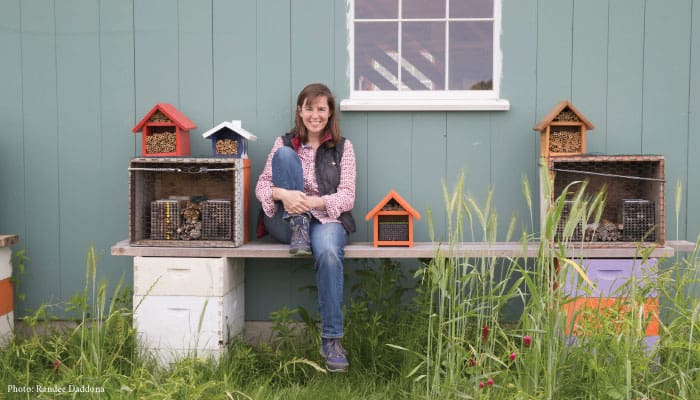The best jam on eastern Long Island is made at Blossom Meadow Farm, in Southold, thanks in no small measure to local bees. Not honey bees, mind you, but wild bees. And that is because when it comes to plant pollination, the latter are better equipped for the job than the former. According to Laura Klahre, beekeeper, jam maker, and owner of the two-acre berry patch that is Blossom Meadow Farm, natives are the work horses of the bee kingdom. Due to a quirk of anatomy, they are able to pollinate both sides of a bud, resulting in shapely, rounded fruit. So why don’t all farmers rely on natives? The answer, in part, is because their flight range is extraordinarily short and their lives are terribly brief. They live for just six weeks, from early spring to early summer, and have a flight range of just three hundred feet and cannot tolerate pesticides. But for Klahre, who has a degree in marine biology and used to work in land conservation, those constraints are why we must do everything we can to preserve and encourage our native species to multiply.

Her awareness of the central place that wild bees occupy in the ecosystem was gradual. In the beginning, she kept honey bees on other people’s land. At the peak of her business, which she incorporated in 2009, she built and tended approximately thousand hives, or eight million bees, on properties throughout the North Fork. But by 2011, she’d come to realize that wild bees were the future. In 2015, now a berry-growing landowner and married to a vintner, she radically re-envisioned and restructured her business. She put up no hives on her farm — wild bees don’t live in hives — and fully devoted herself to native species.

To attract them, she built “nesting blocks.” And then she went out and secured pollination contracts to do the same at local farms and vineyards. Today Klahre, who is also the manager of Coffee Pot Tasting Room (her husband’s wine tasting room, where you can also buy her jam), is one of the very few berry growers in the area who use mostly organic methods. (Although the farm does not have organic certification, Klahre does not spray her bushes with chemical pesticides.) During harvest season, she picks raspberries, blackberries, blueberries, and strawberries twice a day, when the fruits are perfectly ripe. She then immediately transforms the harvested berries into jam, simmering them on the stove with a quantity of sugar. But what really sets her jam apart is that she doesn’t add pectin, a virtually ubiquitous thickener that is touted as flavorless, but which does in fact affect jam flavor. Klahre thickens her jam the old-fashioned way, with time and patience, allowing the fruit to slowly reduce, thereby coaxing out the fruit’s natural pectin. The result is nothing short of sublime. Currently she is working with Surrey Lane Vineyard and Farm in Southold and encouraging would-bee beekeepers to follow her example. “People think you need tons of land for farming,” she says. “But with native bees, you can get by on a tenth of an acre.”






